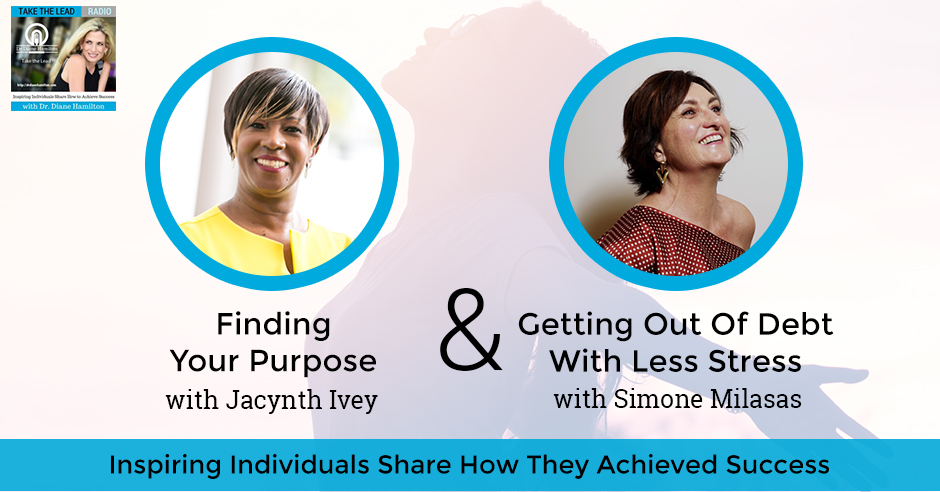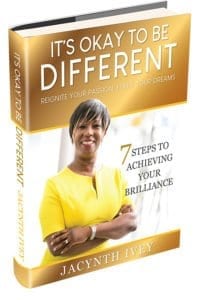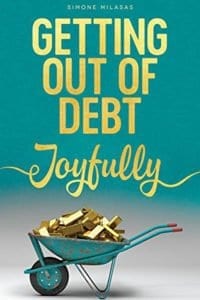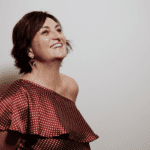Finding your purpose may be hard. However, when you know how to empathize without conforming to how others emote or feel, you will be able to gain your true life’s worth. Today, Dr. Diane Hamilton chats with Jacynth Ivey, a multi-award-winning transformational leader, coach, author, mentor and sought-after inspirational speaker, about her work in helping people build empathy and gain more insight towards finding their purpose.
So many people get into debt and yet they keep piling it up. Today, Dr. Diane Hamilton talks to Simone Milasas, the Founder of Joy of Business and a renowned speaker, entrepreneur, and the author Getting Out of Debt Joyfully. Simone mentors entrepreneurs across the world to create greater wealth and happiness. She shares some ways people can untie themselves from the webs of debt in a less stressful manner.

I have Jacynth Ivey and Simone Milasas here. Jacynth is the Founder and CEO of Jacynth Ivey Global and Inspiring Hope. Simone is the Founder of Joy of Business. We’re going to talk about some great ideas about how to motivate people and how to figure out finding your purpose and much more. We’re going to talk to both of them.
Listen to the podcast here
Finding Your Purpose With Jacynth Ivey
I am here with Jacynth Ivey, who is the Founder and CEO of Jacynth Ivey Global and Inspiring Hope. She’s a multi-award-winning transformational leader, coach, author, mentor and sought-after inspirational speaker. She works with businesses, public services, corporate companies to create peak performance, environments, and sustainable work-life balance initiatives. She’s a chair and non-executive director of a few charitable organizations and she strives to ensure a thriving community. It’s nice to have you here, Jacynth.
Thank you, Diane. It’s wonderful to be here.
Where are you? Are you in England?
I’m in England, the second city called Birmingham.
I was there. I went to the Thinkers50. They have in London every other year. It’s not exactly right where you were, but close for me considering I’m in the United States. It was quite wonderful. I haven’t been to London for a long time so that was fun. I might be going back again, so I haven’t gone in forever and now I’m going all the time.
It will be wonderful to see you when you come back to London.
[bctt tweet=”Your difference is brilliant and adds value. ” username=””]That would be great. You have been busy and you are the author of the long-awaited, It’s Okay To Be Different: Reignite Your Passion, Fulfil Your Dreams, which people can get online. I’m interested in your passion and your dreams because I’m a curiosity expert. A lot of people don’t know what they’re passionate about because they don’t explore or ask questions. I want to get into that, but I want to give a little background on you. How did you get to this point in your career?
If I stopped back to when I was born, it’s been a journey. It’s a family of seven and I’m the fifth child. It’s as simple as I would have the odd chair, I would have the odd knife and fork because everything comes in sixes. I always felt I was different. My parents pushed education and taught us the value of education. I didn’t do well in school, so I was a disappointment to my parents. That made me feel different from my siblings, they all excelled. At school, I was told I would never make anything of myself that I was dizzy and wild-headed and would never be any good or never make anything of myself. I had lots of negative messages fed to me throughout my early years. Those formative years are important. I almost began to believe these messages that I even had struggles when I got married and divorced before I was 30. It was like I can’t achieve anything. I did have a successful career, so I trained as a nurse, as a midwife, as a health visitor and passed my exams the first time. It was like, “Yes.” It’s something I enjoyed.
Throughout my life and my story, there’s always been something where I have felt different. I have also felt the other, not part of what it is happening, the group, the discussion, the successes. I sucked at my own business and in a word, it failed. I ended up on government financial support. Somebody saw something in me and gave me a chance, and he gave me a contract. If they can see something in me, then there are masses in me and I started to love myself again. I started to reconnect with who I was and my identity. I started to say it’s okay to be different. You don’t need to be like anybody else. I started to acknowledge that being different adds much value.
You bring up many interesting things that tie into what I researched with what holds people back from curiosity and a lot of its environment. I was the odd third child. My brother and sister were quite a bit older than I was, 8.5 and 5 years older. They were interested in sports and I wasn’t at all. I was completely different than they were. I’m relating to a lot of your story from my own experience. I found that in my research in the curiosity that a lot of what holds people back from being curious can be everybody around you is one way and then you’re something different. Do you find a lot of people trying to conform and then making themselves unhappy because they are?
In trying to conform, you lose yourself. You’re no longer authentic. You’re no longer true to yourself. You’re no longer doing the things that make you happy or you’re passionate about because you’re trying to fit in.
You think that there’s something that you need to be doing to be more like them instead of searching out whatever your passion is. You talked about having somebody seeing something. What was it that they saw in you?
The individual had seen me in action, so to speak, when I was an executive director, when I was a director employed. When I set up my consultancy, I did a couple of pieces of work for that individual. They remembered that. What was interesting because people have asked me, “What happened to my consultancy business? Why did I end up on government financial assistance?” At that time, I was saying, “The bottom has fallen out of consultancy. Things have changed.” In a sense, that was right. When I look back, what I haven’t done is I hadn’t kept abreast of the changing times. I hadn’t thought about the relationships that I needed to nurture and to maintain. I had been curious enough in terms of what was happening to realize that I needed to change and flex.

It’s hard because we have a hard sometimes looking at our own needs to grow. I know that you study a lot of things that I studied. I saw a lot of your psychometric tools that you’ve become accredited in. I often talk about color analysis, which you have a Diploma in Color Analysis. I worked for a company where we had to take the color tests. The management by strengths was the one we took. We had to put our results on our cubicles so that other people understood our needs of who we were and how we’d like to be communicated. All that gives us a sense of empathy to understand people from their way. Is that what you’re training a lot of that thing? You do a lot of speaking, you do a lot of training. What’s your main focus?
A number of different things but using psychometric tools, I work with people to understand themselves. I get from that place of your need to understand who you are, who you want in whatever context that is? What makes you unique? What is it about you that is wonderful? Where do you need to put your focus? I’m happy to tell you everything that’s wrong with them. I’m not doing this, I’m not doing that. You compliment them, but I’m not good at saying this is who I am. What I do is work with people to help them to acknowledge that they are different and brilliant. That difference is brilliant and adds value. Working with them to get them to that place, we then start to look at trying to get them to understand their reason why that purpose. I start to think because many people that I work with, they go to work on day-to-day. They do this job, they do that task. They’re happy with what they’re doing and they think that’s their lot. It’s helping them to understand. When you say that’s your lot, what does that mean? What are you here to do? What is your purpose? I often say what you put on this earth to do? What is it that you love to do?
Does that ever change?
I don’t think our purpose changes fundamentally. Some people aren’t aware of what their purpose is and fall into a job, fall into something because it brings them money or it brings them a position. It doesn’t necessarily make them happy. It doesn’t necessarily mean that they’re operating within their unique gifts and operating in an authentic manner. People want to be. I can’t imagine anybody who doesn’t want to be happy with what they’re doing.
A lot of people look at their job as a job. You often hear if you do what you love, you make money. A lot of people do that and they never make money and they get frustrated. What do you tell somebody who says, “What I love doesn’t pay,” and they aren’t happy with what they do?
What is it you love about what you love? It’s trying to understand that because we can often make statements without thinking about trying to break that down, where that comes from. Asking that ‘why’ question. What does it bring? When they start to understand the why, what it brings, what it does, it’s helping them to look at how could you get those same feelings, that same sense of purpose within your role? Are there other things that you can do? I’m a firm believer that work is part of what we do but we’re holistic beings. Some people are unable to give up the 9:00 to 5:00 job because it pays the bills, etc. There may be other ways that they could fill that purpose, whether that be if they’ve got faith or spirituality that they could fill that purpose through that way. Exploring different ways we live that people can start to fulfill that purpose, start to live in their why.
[bctt tweet=”There’s an assumption that everybody will have the same reaction, but they don’t.” username=””]A lot of people have golden handcuffs too. I have had jobs where people go, “You are lucky to have that job. I hear it’s the best job.” It’s the job you don’t hate. It drains you. You’re thinking, “If you only knew.” It might be great and from the outside, the perception is, “That’s awesome. You get to travel.” The job I’m thinking of that I didn’t like involved a lot of driving and things that I didn’t like to do. I was more of an office person. I liked certain other types of tasks, and there was nothing wrong with those jobs. Some of us listened to that you go, “I should like this because everybody says that this is what I should love.” You get trapped into that this is the job and what you’re doing ties in well to the questions I’m having people discover. When you explore curiosity, what holds you back? You figure out what is that kept you from this path? What is it that keeps you from asking questions and exploring different avenues? I’m curious when you’re trying to open up that questioning, what do you do to help people look and have more insight into what they could be doing?
It’s a round of questions. It’s the reflective questions, asking them to reframe. It’s saying, “The road that you’ve traveled, you’re saying it’s a dead end. Where are the other avenues?” It’s trying to get them to see things from a different perspective. In NLP, we call it sexual positioning. It’s awesome to sit in a different chair and look at themselves and reflect, look up to yourself in the chair that is opposite you. What do you see? What do you hear?
That’s hard for a lot of people to do. It was funny because my next book is going to be on perception and I researched a lot of this. When you look at that, it’s IQ, EQ, CQ, cultural quotient and even curiosity question all combined. It’s asking questions. A lot of it goes back to the EQ aspect of we’re back to empathy again. It is being able to look at something outside of your own perspective in somebody else’s shoes. I’ve been fortunate to interview Daniel Goleman and other great minds on the show. I remember when I wrote my dissertation on emotional intelligence this neat little subject. Here it is, all these years later, it turns out that I stumbled upon one of the hugest things ever. How do you help people build their empathy?
I don’t think that’s a particularly easy thing to do. I talk a lot with people about the relationships that they have and get them to describe those relationships in terms of what’s good and why is that good about the relationship? How does that make you feel? Therefore, when you’re in that situation with somebody else, how might they feel? It’s a lot of discussions and questioning. I work with individuals trying to get them to identify their own thoughts and feelings.
It’s hard. Some people will jump to their emotional knee-jerk reaction and see things from their perspective. I’ve had people call me getting my input even though my PhD is in businesses not in psychology but they know I’ve studied a lot of this and they sometimes ask my opinion. They have a work-related issue and I’ll go, “She or he sees it like this.” You can hear the pause. That’s something they’ve never considered. Why would somebody think like that? Do we need to ask ourselves what the different options for why that person got upset with me then are? Is it have to be the one definition that I thought it was because that’s what I would do? Don’t you think that we tend to do that with this is why I would be mad?
Absolutely and that’s partly why getting in terms of your feelings, how do you feel, how do they feel, how they emote is different than the other person. It may not be the same as the other person. It is that perception that some people have that there’s an assumption that everybody will have the same reaction and they don’t. When you offer them a different perspective on it, you see this light bulb moment like, “I had never considered it in that way.” What I try and do is try and enable them to come up with some different ways that people might receive something as opposed to imposing on them. I’ll try and get them to think about, “How else could somebody have received this message?”
All of this is important that leaders don’t always get this, the need for this, the soft skills, the emotional training, the whole HR more focused things are sometimes left out in the board setting. What do we need to do for the culture? You serve as a chair and a non-executive director of charitable organizations. I’ve been talking to a lot of people about boards lately because in California here, they changed the law that they want more women on boards. As I’m talking to them, they’re all saying we need more of these behavioral experts like the stuff that you and I talk about on these boards. When you talk to who’s looking for board members? They always seem to want financial experts and all that and they’re missing out on a lot of things that you’re capable of helping them with. Now, as your experience as a chair and non-executive director, do you find that there’s a lot of need for this?

I have been in a board meeting all day. I’m a non-executive director in the NHS, National Health Service, in England. Being in a board meeting all day, what they look for is business acumen, commercial acumen, finance, may have some HR but it’s often transactional HR as opposed to some of the transformational stuff. We’re talking about a number of things and about the need to change our operating model. You start to talk to them about the culture of the organization. Everybody’s yes but almost as if to say the little woman in the corner. The NHS is trying to do a lot to change the culture. There’s been a real need to drive up the gender balance on boards to look at the gender because they are male-dominated. There’s also a national drive to look at the diversity on boards in particular people of color. To increase the diversity on boards, I’m a black woman, so I’m often the only person of color on a board that can potentially bring its challenges. I say it’s okay to be different, I add something different and something unique to the conversation.
You can also get pigeonholed into sometimes talking about cultures and diversity. Do they do that to you at all?
You can get pigeonholed but with my background, I’ve got such a diverse background that I ensure I’m not pigeonholed. There’s something about the way that I ensure that I am prepared for those meetings so that I can add the value to a number of the items on the agenda and not be pigeonholed into anything that is to do with culture or to do with race and ethnicity. That’s sometimes where people want to pigeonhole me. I’m able to contribute to the breadth of that discussion.
You contribute to a lot of different discussions. I was looking at your background of the things you’ve done. You have an eBook and I want to talk about that. It’s Okay to be Different: Reignite Your Passion, Fulfil Your Dreams is I realized it’s the eBook that you offer online. I want to talk about your book. Who is your intended target market for this, your audience? What can they get from getting this book?
I started this interview talking about my early childhood. The book was written as a result of some of my life experiences and acknowledging that it’s okay to be different. It’s written that thinking about people who are successful in their own right. I use that word, successful, because people need to have their own measurement of success as opposed to measuring themselves against others. Successful in their own right, the CEOs, execs, but who still feel like they don’t fit in, there’s something more or different they want. It’s targeted at women and particularly when I think about my role as a woman on the board and some of the challenges that we have as a woman on a board that is predominantly male.
It’s targeted at my experiences of hardships and struggles. Being successful in your own right and then something happens. I’ve worked with people who had years and years of being happily married and then the divorce comes, it changes the whole status. It’s genuine people who feel that they don’t quite fit in, they feel a little bit of a misfit. I’ve been working with some parents whose children don’t fit into their expectations. Their children don’t fit into their expectations in terms of their educational achievements, career or entrepreneur choices. They wish that their child would do X or Y. Why isn’t their child more like me? That’s quite interesting. Their perception is that their child’s the misfit. I’m interested in working with people like that.
[bctt tweet=”It’s okay to be different because you can add something different and something unique to the conversation. ” username=””]That’s challenging. It reminded me when my daughter was in college, she spoke all these languages and I remember suggesting that she might consider global management because she could speak all these languages. She took a couple of classes and she called me upset saying, “I hate this.” I’m like, “This is not what you have to do. It was a suggestion. You should pick the thing that you love.” She turned out getting her degree in Portuguese and loved it. That was wonderful. In business, it’s wasn’t for her. A lot of people would have hung on saying, “No, you need to do this.” That’s hard if you hold people to your goal. It’s got to be their goals.
The important thing is to listen to them. Listen to their hopes and dreams and love them for who they are.
I wish I could get a degree in Portuguese. I could never ever done that. She speaks many languages. I can’t understand any of them. This has been exciting to talk to you. This is all right up my alley of everything that I like. A lot of people will find this helpful. If they want to get your book, they want to have you speak, they want to learn more about you, how can they contact you?
They can contact me at JacynthIvey.com. They’ll be able to download my eBook. When they read the eBook, at the end of each chapter is a little questionnaire for them to reflect on. There’s a free assessment that individuals can take. They can book a call with me to discuss it and we can take it from there.

That’s awesome. Thank you for being on the show. I hope everybody takes time to check out your eBook. I enjoyed our conversation.
Thank you, Diane. It was a fantastic conversation.
It was fun.
Getting Out Of Debt With Less Stress With Simone Milasas
I am here with Simone Milasas who is the Founder of Joy of Business, mentoring entrepreneurs across the world to create greater wealth and happiness. She’s a renowned speaker, entrepreneur and author of Joy of Business, Getting Out of Debt Joyfully and Relationship. Are you sure you want One? It’s nice to have you here, Simone.
Thank you for having me, Diane.
I was looking forward to this. I’m interested in a lot of the things that you talk about. I used to be a loan officer a long time ago. I worked in banking and ended up in all kinds of debt-related industries. It’s interesting to see how much people get into debt and yet they keep piling it up. I’m curious to see what you’ve learned because I saw you climbed out of a little bit of debt yourself. Can I get a backstory and see how you got to this point of writing books and doing all the things you’re doing now?
What most people do is I ignored what was going on. If you knew me at that time, I was AUD $197,000 in debt. That feels a little like pesos. It’s not nearly as much as the US, but it was still a great deal. It was still a hefty amount. I was not aware of the amount I was in debt until I made the demand that I would look at this and start to have a look at my financial reality and change something. Like many people, I’ve done sessions and many people have come along to my classes, ignored it and thought it would go away. One day I realized, “No one is going to come along here and help me. I need to look at this myself.” I sat down in my office. I was organized. I had all my bills there. I wasn’t paying them. The typical thing was spending way too much money.
I looked at all my bank accounts, I looked at all my bills and I went through everything. It took me a while and that’s when I realized I was AUD $197,000 in debt. I was like, “Okay.” It was a bit of a beyond and I started to do that thing of freaking out and getting frustrated and cranky with myself. I went, “You can change this. You’ve got to change this.” I poured myself a glass of wine and I sat down and I started to look at what was creating that. How was I creating that? I had been to a seminar with Gary Douglas and Dain Heer from Access Consciousness, who I work with. I use the Access Consciousness tools in every area of my life and they worked.
I’ve heard them talk about using these tools with money for so long. To me, it was like Diane, despite what’s going on. One day I went, “I’m going to start using these tools and see if something changes. What’s the worst thing that can happen?” Will I end up in more debt if I use some of these tools? It was different. It was Einstein’s definition of insanity. It is doing the same thing and expecting a different result. That’s what I was doing. I was doing the same thing and expecting something to change when I needed to change the way I was with money. I needed to change my point of view. I needed to change what I was looking at and how I was with all of it. I started to use some of the access tools and within two weeks, my financial reality had a different energy about it.
[bctt tweet=”Receiving is a huge part of creating more money showing up in your life. ” username=””]It did start to change. I started to earn money from the most random of areas. I started to look at where money was coming in and where I was spending it. A lot of different things showed up even from one of the things that showed up with my father, who I love and adore the man. He passed away a few years ago now and he always wanted to give it to me. He loves me so much and I’m his petulant little daughter going, “I don’t need your money. I can do this on my own.” Poor man. At this, I realized that I had this insane point of view too that he’d said to me once that he would never die until he knew all of his kids were financially stable.
It was important to him. He escaped during World War II, come look away in the art of this whole story. He wanted us to have a good education and be financially stable. I realized that my two stepsisters and my brother were doing okay. This is an insane point of view and I see so many people have an insane point of view that blocks you up. It’s not our logical mind that we changed things with, it’s the insane points of view that create the disaster. I realized that my point of view was I wanted to create myself to be a financial mess so my dad could stay alive.
That’s ridiculous. I even spoke to him about it and he ended up giving me a check for $50,000. I was grateful but I received it. To watch his whole body relax and the fact that I was receiving him and receiving the money, I realized how unkind it had been for me for years to not receive from him. That’s one aspect that is out of the box. I get that most people are not willing to receive from those around you even the people that you don’t know. Receiving is a huge part of creating more money showing up in your life. There was one aspect that changed a lot for me.
Your father is the exact opposite of what my father said to me. My dad would show up to dinner with his empty wallet and expect me to pay. I have the exact opposite experience.
My mother does that. I’ve got one parent like that.
I would be willing to receive it, let me tell you, but I didn’t get any offers. It would be nice to have that. I could see though there are a lot of people who don’t feel comfortable taking things. You’ve mentioned Access Consciousness a few times and I want to make sure that everybody understands what it is because you’re the Business Development Manager for Access Consciousness. You have grown it from operation in four countries to 176 countries. You travel the world, you do all these seminars, in-person classes and all these things. Tell people what exactly Access Consciousness means.
The simplest way to say it is Access Consciousness is a set of tools and processes that can change any area of your life that you think is not working for you. Many people think they have a problem with something and it’s something different. People think they have a money problem or relationship problem or a problem with their business, etc. It’s usually something else and you can change anything. It’s about changing any area of your life that you think is not working for you is the best way to say that.

How did you get involved in that?
I had a business called Good Vibes For You which I designed to change the world with that. We were doing different merchandise and had sayings on shirts, magnets, stickers, and everything. My attempt at changing the way people looked at themselves, each other, look at the world, and coming out of judgment. I was at the MindBodySpirit Festival in Australia. I met Gary Douglas, the founder, there and I was like, “Look at this guy talk. This guy is amazing.” I went to a seminar that he did and it was on relationships. At that time, Diane, I’m not doing relationships. I don’t see a good one that’s doing that. I went to sit to this relationship class that he did and I wanted to hear him talk. I didn’t have a point of view of what it was about.
I remember walking out of that seminar after a couple of hours and it was the first time ever that someone had not made me feel wrong for not desiring to have a relationship. It was cool. He was talking about everything I knew possible in the world except nobody had spoken about it. He was irreverent. One of the things that he said, which I loved, was, “Don’t trust me, trust you.” I was like, “Thank God, someone’s not telling me that I have to trust them and follow someone blind down some roads.” It was like someone’s finally empowering me to go, “You know what you want with your life.” My dad was much like that too. He was always like, “You know what it is you want, you’ve got to choose for you.” It was similar energy.
Gary Douglas was interesting on the show. He can be irreverent and I like that. He tells it like it is. You need to be blunt when it comes to money sometimes because I don’t think people see it as tangible. They go, “Will you go to the bank?” It pops out or you write your name on this piece of paper and it pops up. There’s all this free, everybody’s trying to give you all this credit. All these ways to get all this money. I noticed when I was an account executive for a bank when people were trying to get loans when the subprime was popular. They’d come in, they expect stated loans, which means they could say how much money they made. They didn’t have to prove it.
I would have people who you knew couldn’t possibly make that much money. They were hostess or something in a restaurant and they were trying to buy a $1 million house. I’m thinking, “What world are you living in that you want even to put yourself in that position?” I’m one of those people that always loved Quicken. I’m a geek when it comes to I love to look and get that number higher and the red number lower, whatever it is to get it. I don’t like debt but a lot of people don’t even think about it. You were shocked by your dollar amount when you took a look at that. What is it that keeps people from having a realistic perception of how much debt they owe? Do they plan on going bankrupt? What is it that they’re planning?
I was talking to someone about this too. I’m in Vienna, Austria and we’re doing a class called Relationships Done Different but it’s the same thing. I was saying many people like to lie to themselves and they lie to themselves about their relationship, money, and what they are creating. The interesting thing is how many times has a lie created something greater for you? It doesn’t. What I realized was when I was willing to not lie to myself anymore about my finances, I created much more. I rang every single person I owed money to. I rang them whether it was a friend or something or whether it was an institution. I rang every single person and I said, “I’m aware that I owe you this amount of money. Is that correct?” When they said yes, I said, “I’m doing everything I can to pay you off.”
[bctt tweet=”Ignorance is not bliss. Srart to look at your finances and get clear on what it is that you’re creating. ” username=””]Some people I was doing $20, $50 a week to pay them off. There was a guy who used to make my graphics, the speaker in this training said to me, “I’m earning my $15,000.” It was him and his wife and he said to me, “My wife and I want to take you out to dinner.” I was like, “You’re going to take me out to dinner and I owe you this money? I’m telling you I can’t pay it right now.” He said, “Yes, I do. I’m grateful you called me. I believe in you. I know that you can do this.” I tell you what, it created something different with the engagement and the relationships that I had with the people I worked with and with my friends instead of ignoring it.
Ignorance is not bliss. People think ignorance and lying is bliss. It’s not. I cannot tell all your audience enough that if you sit down and start to look at your finances and get clear on what it is that you’re creating. I know one of the books that I wrote was Getting Out Of Debt Joyfully. There are lots of tools in that book, but one of them that I say to do is write down every single thing that it takes to run your life. I’m talking not living on a budget. What does it take to run your life like your rent, your mortgage, and your electricity bills? Do you like to drink nice champagne or cheap champagne? Do you want to go out to dinner? Do you like to get a facial? What is it that you would your life to look like?
Write down everything that it costs, add 20% because there’s always something else there. What I always recommend too is get a profit and loss statement, either 6 or 12 months is better. Ask your bookkeeper or your accountant for profit and loss because quite often we’ll do something that says, “I spend about $200 for gas a month, but you forgot you’ve got tires in September and then you’ve got the registration, etc.” If you look at a profit and loss statement, it’s a lot more truthful for what it truly is that it costs you. It might end up being $250 or $300 a month for your car. You get clear on each month how much money that you have to bring in. The first time I did this, it was $8,000 a month. I sat there again at my kitchen bench going, “How am I going to do this? I’m going to pay $8,000.”
I poured myself a glass of wine. A glass of wine calms me down. I sat there and went, “What can I create?” One of the things that my father always taught me as well was look at your expenses, look through it. Do you need it all? If you need it, that’s great. Now, what else can you create? What if life wasn’t cutting out your expenses? What is living? What else can you create? What else can you add? Every single time I’ve done this, I did this every 6 to 8 months because my life changes all the time. Every single time I’ve done it, within 2 or 3 months, I am making that amount of money and more because you put your attention on it. Many people who get into debt, as you would know to work in that financial industry, they don’t have their attention on the money. They have their attention on everything that they think they should have without being realistic of what it is that you’re creating and the money that you’re bringing in. Get clear on it and you can change everything.
A lot of people don’t do what you’re saying and they need to. A lot of them are counting on their real estate if they have it is going to make them all this money in the future. That was one of the problems we saw with the subprime industry. People would get these incredibly high-interest loans thinking, “In two years, my credit will be better. I can refinance because the house will be worth much.” They’re counting their chickens and sometimes those don’t hatch. I don’t know how they sleep worrying about a lot of this debt. Did you have a problem sleeping when you were going through all this? Do you think that people separate themselves from it all?
They do separate themselves and everyone’s different as well. The way you said that, did they separate themselves from it? Yes and that’s definitely what I would have done. I didn’t have sleepless nights but I wasn’t all of me. I wasn’t present with myself in every moment whereas now I would be. I’m aware of how much money I have, how much money I earn each month and what bills I have. In truth, I’ve got quite a few different real estate, so I’m in debt again. It’s debt more so from owning real estate.
You own part of the castle in Italy. Where in Italy? My daughter’s getting married in Lake Como. Where is your castle?

It’s about 1.5 hours outside of Milan, but it’s called Casalborgone. It’s absolutely beautiful. It’s stunning. I own it with Gary Douglas and there’s about eight of us that own it. We bought it and no one has lived in it for 40 years. It was incredibly rundown. What we’ve done to it, we refurbished the whole thing and it’s one of the most beautiful places I’ve ever been to. The sense of peace there is stunning. I would never have thought that I’d own a castle in Italy.
You also eco-retreat in Costa Rica. You have the Antique Guild in Australia. You have all kinds of things you invest in now. How do you pick what you invest in?
People are going to hate that I say this, but it’s what’s fun for me. I’ve played on the stock exchange for quite a few years as well because I like looking at companies and seeing what they’re doing. My portfolio ended up from penny stock. Myself and Brandon, who I work with, and Gary and Dain, all of us ended up buying a house on the river in Queensland from this penny stock. I kept buying more and more. It was interesting. My accountant said to me, “Simone, you’re putting all your eggs in one basket.” I was like, “I know this is going to go up. I knew it.” I would have $1,000 here, $1,000 there and I kept putting money into it. It went up and she said to me afterward, “Why didn’t you tell me about this?” “I did tell you. You thought I was crazy.”
It’s what’s fun for me. It is hard to know. If you invest in something, many people go, “I buy this house, etc. and then this is going to go up and I can sell this.” You can’t invest in the outcome. Any money I spend on anything like that, I’m willing to lose it. What ends up happening is I’m not losing it. I end up making money, but I’m not relying on it. When you rely on something like that, that’s when it starts to create that destruction. Even people, if you look at the energy that it creates when you wholly rely on somebody else for everything, that’s a need that doesn’t allow for change and doesn’t allow for creativity. When I buy stocks on my portfolio, I’m willing to lose it all. When I invest in property in Costa Rica or the castle, I’m willing to lose it all and then it allows the space for attraction to create money unless something different shows up.
A lot of people reading are going to be Gen Xer or Boomers, for example, if they’re trying to think about if they ever get to retire or not. As we’re talking about planning for retirement, you had talked about your profit and loss, adding 20%, all that kind of thing. Are people going ever to be able to retire? Do you think that we’ve got to a point where that’s not going to be the norm anymore because we can’t afford to have the lifestyle? Nobody can save up enough because they’re not thinking about it enough. Are we too late to catch up?
It’s a different situation for many people. I’ve got to say, the number of people I know that have no desire to retire. Even my father was 92 when he died. Mom didn’t want him to work anymore. He was sneakily doing the bookwork for the local Bridge Club where he lived because he loved working. I feel much the same. I love creating, I’m a creative person, so I could never see myself retiring. I’d always create something. What if there was a different mindset and we started looking at what could you create? You might want to slow down. Work fewer hours or something like that. It wasn’t much about that’s what you’re aiming for is retirement. I didn’t know about America, but in Australia, we have super funds that you can put a certain amount of money into each year at a low tax rate that is for your retirement.
[bctt tweet=”Judgment never creates anything productive. ” username=””]You are allowed to invest in something that is perceived to have an intrinsic value of some sort like real estate. I know that’s encouraged as well. You should start looking at that because I would say a 30-year-old not looking at that thinking, “I’ve got many years for that.” If you use it to your advantage of, “I can put a certain amount of money away at a low tax rate and then invest in something. I have a stock portfolio that I use from my super fund,” so it can grow based on that. It’s about getting clear on what do you want to create? If you do want to retire at a certain age, then start looking at it and looking at how would you like to live after you retire? How would you like to live when you’re 60, 70, 80 or 90? What action could you take now that would allow that to show up with absolute ease because you get to choose?
A lot of people are starting businesses in their 50s, 60s and things. They never used to. It’s amazing what you can do. You talked about something that I talk about because of my work with curiosity, I found four things that keep people from being curious. They’re fear, assumptions, technology, and the environment. The assumptions are that negative talk. You mentioned people have this negative talk and what we’re telling ourselves. What are we telling ourselves that we shouldn’t be telling ourselves?
That you can’t do it, that it’s not possible. That is such a mindset too. If you come out of judgment, that’s one of the biggest killers. Judgment will never ever create anything. If you look at your body, for instance, how many people wake up in the morning with this liberty of judgment? It’s not judging how big their butt is? Your butt has never gotten smaller by judging it. It’s the same thing with money, same thing with business, same thing with all of it. If you come out of judgment, then you can create something different. You’ve got to be vulnerable with that too though, to wake up in the morning and go, “I’m not wrong.” Even start with a question of what’s right about me? I’m okay. What would I like to create now? Stopping and question instead of the conclusion of the limitation that you’ve created.
What’s the biggest tip you’d give somebody who’s reading this to get out of debt, to feel better, to be less stressed. What are the biggest words of wisdom you want to leave them with?
Know that you can change it and do it now. Don’t make it about tomorrow. What different choice could you make now?
This is the time of year they’re starting to think about that because another year is down and they’re still not out of debt. This is good timing for all of this. A lot of people could learn from your work. You are the Founder of Joy of Business as I mentioned. You’re the author of Joy of Business and Getting Out of Debt Joyfully and Relationships, Are you sure you want One? How can people find you if they want to find out more?
On Instagram it’s my name, @SimoneMilasas and that’s also my website. It’s SimoneMilasas.com and also AccessJoyOfBusiness.com. You can also go to AccessConsciousness.com. There are lots of websites. You can go to one of those, you’ll find everything.

That’s awesome, Simone. I had a good time. Next time you go to your castle, say hi to Gary for me. It was nice to have you on the show.
Thank you, Diane.
You’re welcome.
—
I’d like to thank both Jacynth and Simone for being my guests. We get many great guests. If you’ve missed any past episodes, please go to DrDianeHamilton.com. You can listen to the show there. You can find out more about curiosity, developing it, how to take the assessment. I hope you join us for the next episode of Take The Lead Radio.
Important Links:
- Jacynth Ivey Global
- Inspiring Hope
- Thinkers50
- It’s Okay To Be Different: Reignite Your Passion, Fulfil Your Dreams
- Daniel Goleman – previous episode
- National Health Service
- JacynthIvey.com
- eBook – It’s Okay to be Different
- Joy of Business
- Joy of Business – book
- Getting Out of Debt Joyfully
- Relationship. Are you sure you want One?
- Access Consciousness
- MindBodySpirit Festival
- Gary Douglas – previous episode
- @SimoneMilasas – Instagram
- SimoneMilasas.com
- AccessJoyOfBusiness.com
- AccessConsciousness.com
About Jacynth Ivey

Jacynth Ivey is the Founder & CEO of Jacynth Ivey Global and Inspiring Hope. She is a Multi-Award-Winning Transformational Leader, Coach, Author, Mentor and sought-after Inspirational Speaker.
As Founder of Inspiring Hope, Jacynth works with Businesses, Public Services and Corporate Companies to create Peak Performance Environments & Sustainable Work Life Balance Initiatives. As Chair and Non-Executive Director of a few charitable organizations, Jacynth strives to ensure a thriving community for all.
About Simone Milasas
 Simone Milasas is the founder of Joy of Business, mentoring entrepreneurs across the world to create greater wealth and happiness. She is a renowned speaker, entrepreneur and author of Joy of Business, Getting out of Debt Joyfully and Relationship Are you sure you want One? Simone inspires thousands to know anything is possible, to never make yourself less than and to create an extraordinary business and life.
Simone Milasas is the founder of Joy of Business, mentoring entrepreneurs across the world to create greater wealth and happiness. She is a renowned speaker, entrepreneur and author of Joy of Business, Getting out of Debt Joyfully and Relationship Are you sure you want One? Simone inspires thousands to know anything is possible, to never make yourself less than and to create an extraordinary business and life.
Climbing out of $187K in debt, she is now an investor in multiple ventures including a part owner of a castle in Italy, an eco-retreat in Costa Rica and The Antique Guild in Qld Australia. Simone is the Business Development Manager for Access Consciousness® and has been instrumental in growing it from an operation in 4 countries to a staggering 176 countries across the globe. She currently travels the world facilitating numerous in-person classes and seminars and is also one of the leaders for the Actions for Futures organization.
Love the show? Subscribe, rate, review, and share!